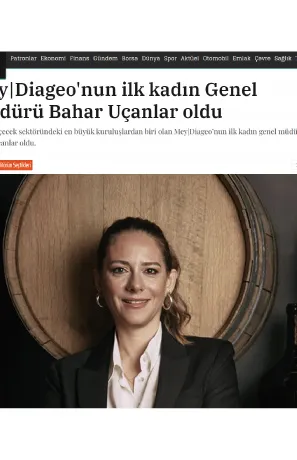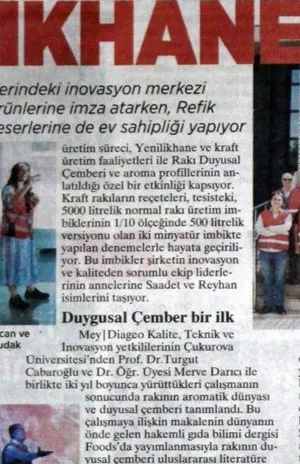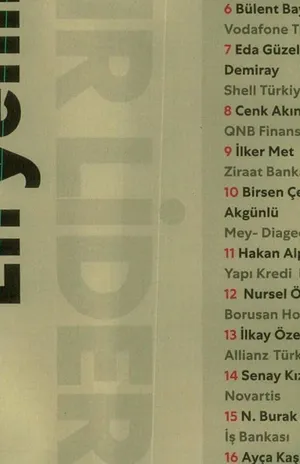- Home
- News About Us
- Marketing Turkiye / The First-Ever Tradable and Registered Aniseed in Turkey by Mey|Diageo
Marketing Turkiye / The First-Ever Tradable and Registered Aniseed in Turkey by Mey|Diageo
01 March 2021
THE FIRST-EVER TRADABLE AND REGISTERED ANISEED IN TURKEY BY MEY|DIAGEO
With raw materials wholly consisting of agricultural products, Mey|Diageo considers sustainable agriculture as an investment in the future. Stating that this is why preservation of the land is one of their top priorities, Kursat Apan, the Supply Chain Director of Mey|Diageo, said, "As part of seed development activities we carried out in cooperation with Ege University, the first tradable and registered aniseed was produced in Turkey. Our goal is to become a role model for other producers by setting an example for quality domestic seeds."
What does "agriculture" mean for Mey|Diageo?
For us, agriculture is an indispensable issue. We are one of the largest enterprises, which holds a farmer's license, and which is engaged in viticulture in its own lands. Our company started structuring for farming in 2005. We have obtained a Farming License in 2011. We supply all of the agricultural ingredients of our products from Turkey. In particular, for raki, grapes and aniseed must be obtained from and grown in Turkey as per the Geographical Indication. For wine production, we make use of our wine grapes, which we obtain from our own vineyards of 55 hectares located in Sarkoy and Elazig. We also receive a partial supply of grapes from our contracted farmers in our country. We are an agro-based industrial enterprise. Therefore, it is one of our top priorities to preserve our land. We make procurement of wheat, grapes for suma, wine grapes, raisins and aniseed as agricultural raw materials. So, we touch about 27-28 thousand producers.
Can you please tell us shortly about your perspective on "sustainability in agriculture" as a company?
For us, sustainability is not an issue that we can regard as "good to have". Because we do our best not for fulfilling our corporate social responsibility, but for being a responsible social organization. While producing our products, we act with the vision of carrying the legacy from the past to the future, and we take it as our duty to ensure the sustainability of our raw materials by contributing to our country's agriculture, while fulfilling this responsibility. Our efforts in this respect include mainly farmer support, training and awareness-raising programs. We attach great importance to cooperation with universities and particular importance to the fact that we need to walk in light of science. In this context, we run joint projects with the agricultural and food engineering faculties of the leading universities such as Ege and Cukurova with respect to seed improvement and quality improvement.
We know that "the first-ever registered and tradable aniseed in Turkey" was produced as part of your cooperation with Ege University. How did this project develop?
We work on aniseed improvement in cooperation with the Faculty of Agriculture of Ege University in order to increase the quality of aniseed. For us, sustainability is not an issue that we can regard as "good to have". Because we do our best not for fulfilling our corporate social responsibility, but for being a responsible social organization. We started to work on it because of the significant decline in the quality and the great loss of yield. The decline in the quality resulted in more aniseed consumption and therefore, our costs started to increase significantly. On the other hand, the decrease in the yield increased the costs of the farmers, reduced the profitability and made the farmers consider their preferences of aniseed planting. So, the reflection of increased costs in the prices was inevitable. Consequently, the number of producers in the villages decreased and the rest of producers started to prefer alternative products to aniseed, or the fields were left uncultivated. So, the aniseed yields decrease significantly in Turkey.
After these developments, we decided that we had to take an action and meet with academics from Ege University, because there was no registered seed and seed development effort in Turkey, and we started to work on seed development in accordance with the agreement executed with Ege University in 2014. Our aim was to produce a seed variety to help us increase the yield and the quality of the product. After 7 years, we obtained 3 types of new seeds and made an application for registration to the Ministry of Agriculture for the seeds. Developed as of 2020, these 3 new varieties were named as "Yeni 37", "Ege 53", "Altin 8", and officially registered under the name of Mey. The field trials revealed that these seeds had about 20-30 percent higher essential oil content compared to producer seeds planted in the same field. These 3 seeds are the first-ever registered and tradable aniseed in Turkey.
Workforce is another important issue for agriculture. Can you please tell about the support you provide in this respect?
As part of our farmer support project, we provide 1.000 producers with high-yielding aniseed every year, and we promote aniseed, which plays an important role not only in the beverage production but also in the pharmaceutical industry, to have the best quality and become an export product. In order to increase the declining production in the main location, we helped the producers with seed, diesel and fertilizer aid in order to increase the decreased production in the main region.
"As part of our farmer support project, we provide 1.000 producers with high-yielding aniseed every year, and we promote aniseed, which plays an important role not only in the beverage production but also in the pharmaceutical industry, to have the best quality and become an export product."
We procure products from nearly 1.200 producers and provide support to 700 producers annually. We provide same conditions and pay same wages to women as men working in our vineyards. It is very important for us to contribute to the sustainability of the workforce, particularly during this challenging time. Special for the pandemic, we procured 2 thousand tons more Okuzgozu grapes than we needed in Elazig. We provided 2.372 people staying in 392 tents set up for seasonal workers in Manisa with sanitation packages.
Do you make any efforts on new generation agriculture?
We believe that it is possible for the producers to get quality and efficient products by keeping up with the latest technology and strictly complying with the cultivation know-how and practices. This will help producers gain economic advantage, and the outflow of people from villages and agricultural sector, which is an important problem in our country, will be prevented. This is why we provide our contracted producers with financial and technical support, and channel them from traditional production into innovative production. We provide financial support and training thanks to the farmer support project.
On the other hand, we continue to establish cooperation with universities. We run laboratory studies to produce new generation and efficient seeds. We will soon bring the greenhouse project, which will make it possible for us to plant and grow different seeds, into life, and we will carry out several trials. We have also built meteorology data stations in our vineyards located in Sarkoy and Elazig. This helps us contribute to quality cultivation by monitoring the effect of climate on raw materials closely.
In Yenilikhane, Turkey's first raki R&D and innovation center located in our Alasehir plant, we continue to work on the agricultural products we purchase.




